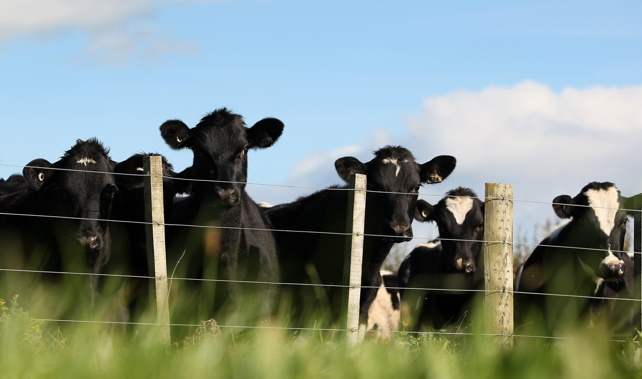
A network of Open Brethren-run charities that have quietly accumulated hundreds of millions of dollars in farmland are facing a Charities Service investigation following complaints their tax-free status allows unfair competitive advantage.
Sparked by an detailed five-page anonymous letter in 2015, the investigation is looking into a network of registered charities, limited partnerships and companies centred on Trinity Lands, a $300m dairy and kiwifruit conglomerate largely based in the Waikato.
The case has sparked calls from academics and tax experts for the Government to review laws allowing charities to reinvestment profits from commercial operations tax-free.
Gray Baldwin, a trustee of Trinity and chairman of shareholding charity Longview Trust, said he was unaware of the Charities Service investigation but would co-operate fully with it.
"In a modern democracy I'd expect to have to answer these questions and we're happy to be scrutinised. We absolutely agree and accept it is a privilege to operate tax free. Our challenge is to make sure we can demonstrate, to wider society, we are pulling our weight," he said.
Trinity controls a dairy herd approaching 12,000, hundreds of hectares of forests, and orchards that last year produced more than a million trays of kiwifruit.
The charitable company was formed in 2012 by the merger of three charitable trusts set up decades ago by Open Brethren members to "farm for God". The three trusts aim to advance the Christian religion and distribute funds to causes including Bible colleges and Christian school camps.
Trinity is run by Peter McBride, and has quietly become a significant player in New Zealand's multi-billion dollar kiwifruit industry. Trinity is now the single largest shareholder in Zespri, and McBride has also been chairman of the kiwifruit marketer since 2012.
A review by the Weekend Herald of Trinity's financial statements - and those of its shareholder Lichfield Land and the Hillview and Longview trusts - shows between 2012-2016 it reported tax-free profits of $21.6m.
These profits were partly distributed to its charitable shareholders ($10.25m) and then distributed to various causes, or directly donated ($2.5m) for purposes including an ambulance for the South Waikato.
Reinvesting the remainder of its profits, and an appreciation in farmland value, saw Trinity's net assets over the period increase from $100m to $174m.
McBride said Trinity's policy was to reinvest half of its profits, and distribute the remainder.
"The Board believes this is prudent commercial practice and reflects the agribusiness environment we operate in," he said.
McBride added the 2017 financial year had seen difficult trading conditions, resulting in a loss, but Trinity took on more debt to ensure its shareholding charities received $3m to distribute.
The complaint letter to the Charities Service also drew attention to a $14.8m investment by the Aroha Nui Trust in a commercial company run by McBride that generated poor returns for a number of years.
McBride said the company, South East Hort, had been hard-hit by the PSA virus, but had recently returned to profitability.
Phillip Price, an accountant working for the Trinity Network, said: "To the best of my knowledge all investors [in South East Hort] are happy with their investment and there is no personal benefits that would put any of the charitable organisations in breach of their obligations."
Tax and trust experts spoken to by the Weekend Herald said the Trinity Network's structure and reinvestment fell within the law, but the case raised wider issues that should trigger debate about possible reform.
Trust lawyer Vicki Ammundsen said Trinity's operations were entirely within the law, but they appeared inequitable.
"It is what it is, and I appreciate it does from a commercial perspective ... it does create an anti-competitive advantage. If one of you is paying tax and the other isn't, it's hard to dress that up as OK," she said.
Andrea Black, a tax commentator and former adviser at Inland Revenue, said current tax and charity rules set no requirements on how much of their income charitable companies should distribute to good causes.
"Ultimately tax concessions given to charities are because they do good things for the community. The current rules, however, allow businesses connected to charities to build up capital and for charities to create reserves rather than fully distribute their income and capital," she said.
"I would love to see rules which required all tax free income and all donations receiving a tax credit to have to go directly to community causes."
Michael Gousmett, an adjunct fellow at the University of Canterbury, said he'd run the numbers in 2015 and found the Government was missing out on $50m in tax from the commercial operations of New Zealand's 28,000 charities.
"That is fundamental flaw in terms of tax policy, because I don't think the intention was ever for commercial activities of charities - where the activity is unrelated to their charitable purpose - to be exempt from tax," he said.
"It's the same with Trinity: This is an issue that needs to be addressed at government, and tax policy, level."
Australia changed its tax laws in 2014 requiring charities making commercial income not directly related to their charitable purpose only tax-free if it was distributed to a good cause.
This measure was intended to capture business reinvestment, but appears complicated to administer in practice. Sanitarium, an Australasian cereal-maker owned by the Seventh Day Adventists, argues its vegetarian tenets makes the production of Weet-Bix a religious activity.
Revenue Minister Judith Collins declined an interview with the Weekend Herald on the tax treatment of charities and instead provided a written response issued through a spokewoman.
The statement said Collins was aware many charities undertook commercial activities, but said such income was tax-exempt if profits were ultimately used for charitable purposes.
"Inland Revenue works closely with the Charities Services team at the Department of Internal Affairs to ensure charitable funds are used in this way," she said.
A spokesman for Inland Revenue - which is understood to have received the same complaint that sparked the Charities Service investigation - said IRD was unable to comment on the affairs of the Trinity network "due to secrecy provisions in the Tax Administration Act".
Speaking more generally, the spokesman said charities were occasionally reviewed and - if tax-free profits were being used for private benefit - charitable status could be revoked, triggering tax on any accumulated assets unless the funds were transferred to another charity.
"We are in a different position however with income which is simply accumulated by the charity, as there are no specific requirements as to how often a charity must make charitable distributions or how long they can accumulate income for. That is a business decision over to the charities themselves."
Take your Radio, Podcasts and Music with you









